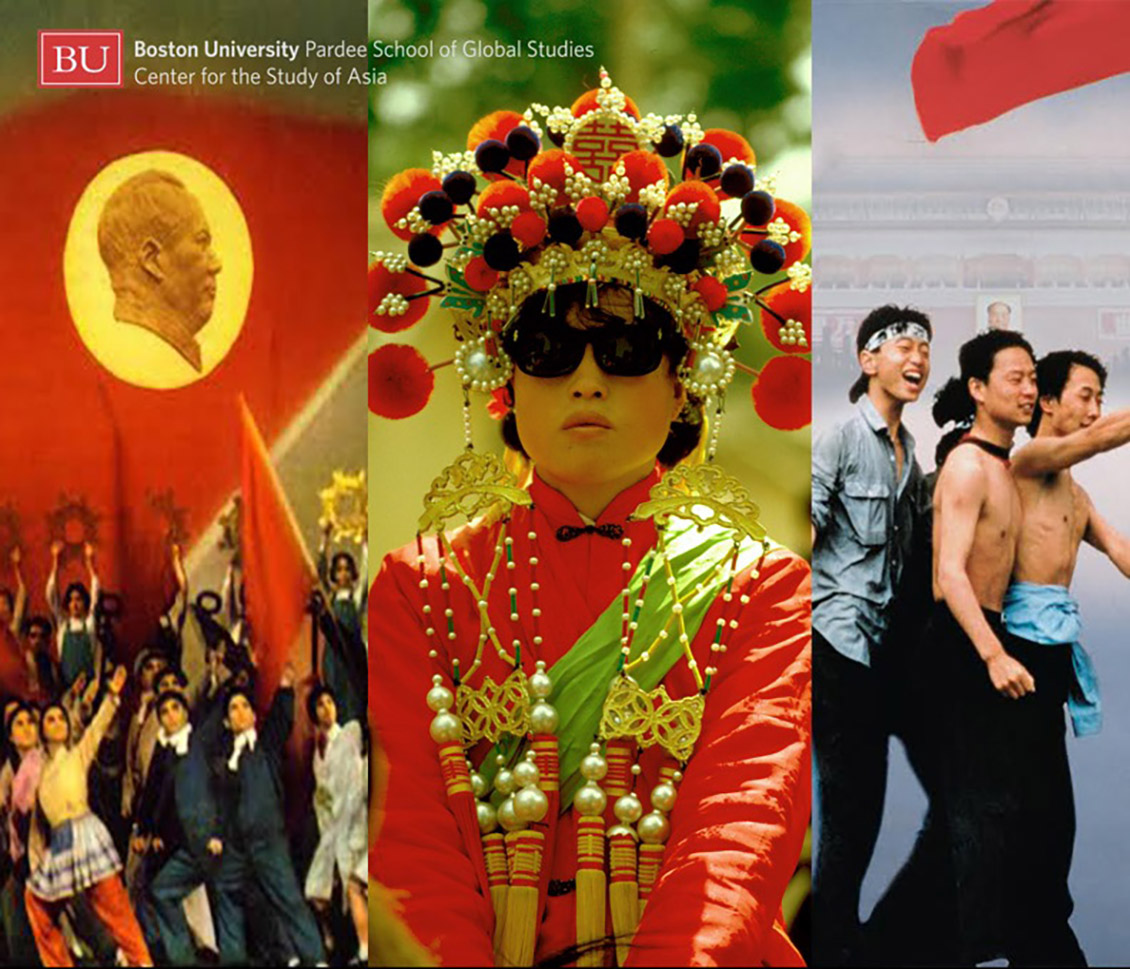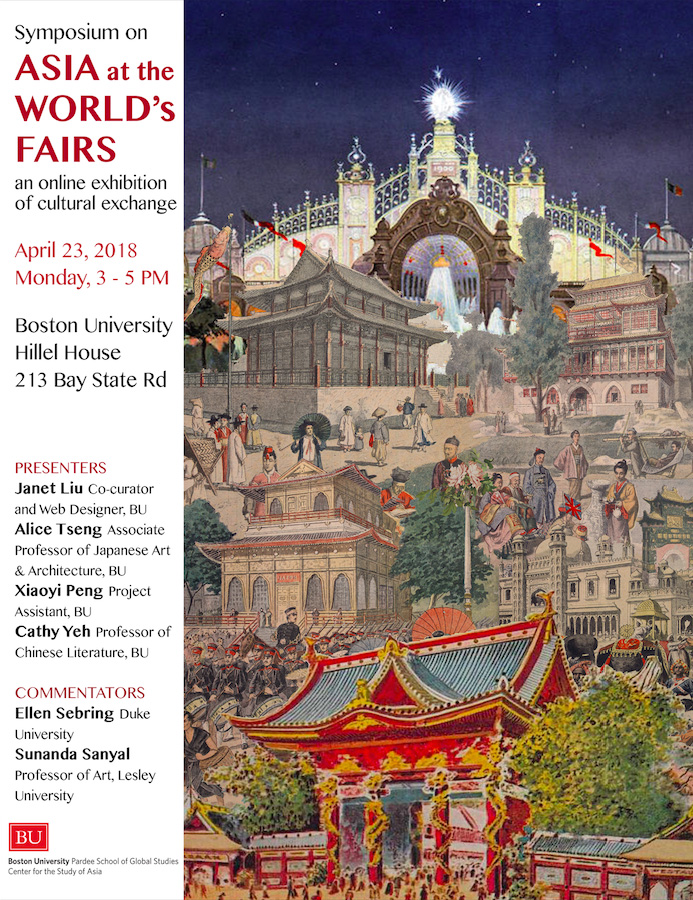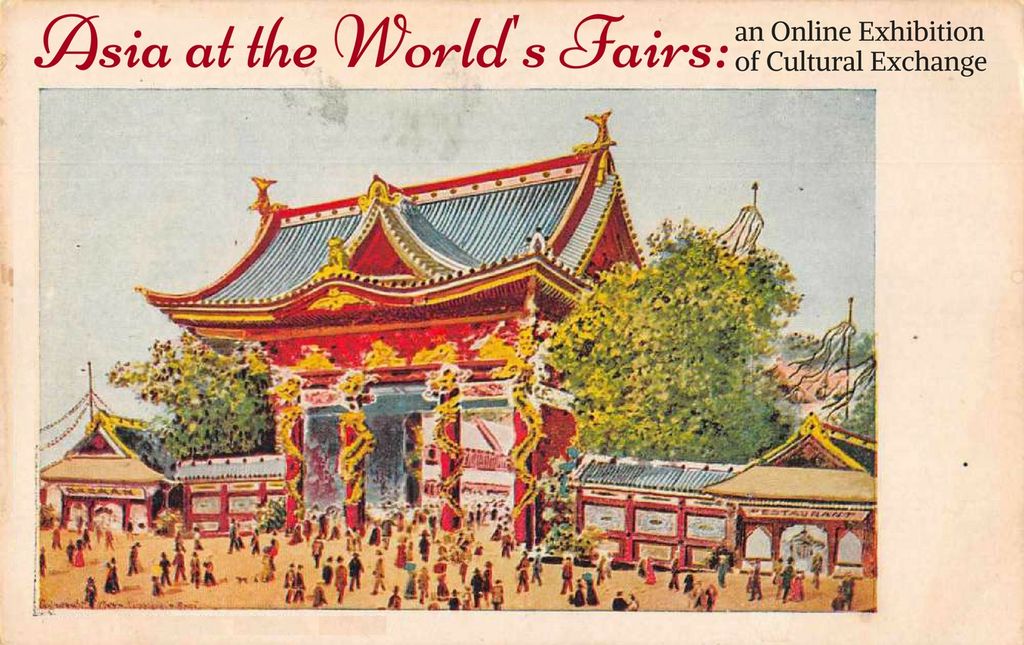History in Images, History in Words: In Search of Facts in Documentary Filmmaking
History in Images, History in Words:
In Search of Facts
in Documentary Filmmaking
A lecture by Carma Hinton
Robinson Professor of Visual Culture and Chinese Studies at George Mason University
Monday April 10, 2017 from 4-7 pm
at the Photonics Center (9th fl.), 8 St. Mary’s Street, Boston University
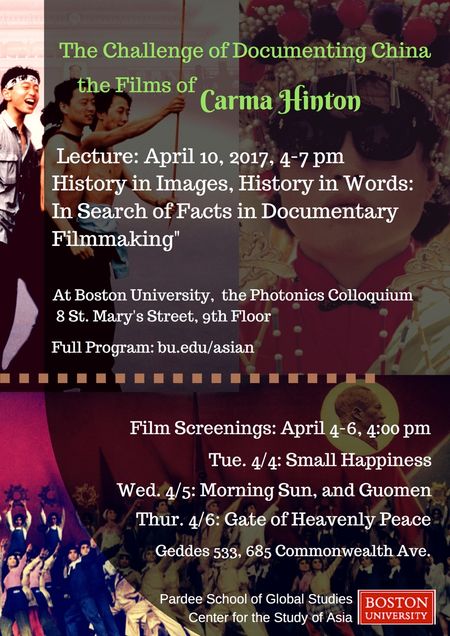 My presentation will focus on the process of documentary filmmaking, especially the many challenges my team and I faced in trying to create engaging filmic narratives that are both factually accurate and encompass multiple perspectives. I will use excerpts from my films as well as out-takes to illustrate the difficulties in determining what information to include and exclude, assess the compromises involved in the choices, and explore the consequences of taking various possible paths. I will also address the different problems that a historian encounters when presenting history in images as opposed to in words: the potential and limitation of each medium and what information each might privilege or obscure. I believe that in this age of “alternative facts” and “parallel universes,” reflections on the challenges in obtaining authenticity and truth and the importance of relentlessly striving to reach this goal, take on particularly urgent meaning.
My presentation will focus on the process of documentary filmmaking, especially the many challenges my team and I faced in trying to create engaging filmic narratives that are both factually accurate and encompass multiple perspectives. I will use excerpts from my films as well as out-takes to illustrate the difficulties in determining what information to include and exclude, assess the compromises involved in the choices, and explore the consequences of taking various possible paths. I will also address the different problems that a historian encounters when presenting history in images as opposed to in words: the potential and limitation of each medium and what information each might privilege or obscure. I believe that in this age of “alternative facts” and “parallel universes,” reflections on the challenges in obtaining authenticity and truth and the importance of relentlessly striving to reach this goal, take on particularly urgent meaning.
About the speaker:
Carma Hinton is an art historian and a filmmaker. She received her Ph.D. in Art History from Harvard University and is now Robinson Professor of Visual Culture and Chinese Studies at George Mason University. Together with Richard Gordon, Hinton has directed many documentary films, including Small Happiness, All Under Heaven, To Taste a Hundred Herbs, Abode of Illusion: The Life and Art of Chang Dai-chien, The Gate of Heavenly Peace, and Morning Sun. She has won two Peabody Awards, the American Historical Association’s John E. O’Connor Film Award, the International Critics Prize and the Best Social and Political Documentary at the Banff Television Festival, and a National News & Documentary Emmy, among others. Hinton is currently working on a book about Chinese scrolls depicting the theme of demon quelling. Carma Hinton was born in Beijing. Chinese is her first language and culture.

Amirhossein Bayani: Out of Context. Exhibition opening reception July 6, 2018 at Ars Libri, Boston
Opening reception for the new exhibit
Amirhossein Bayani: Out of Context
Friday, July 6, 2018 from 5:30 to 7:30 pm
at Ars Libri, 500 Harrison Avenue, Boston, MA 02118
www.arslibri.com
617 357-5212
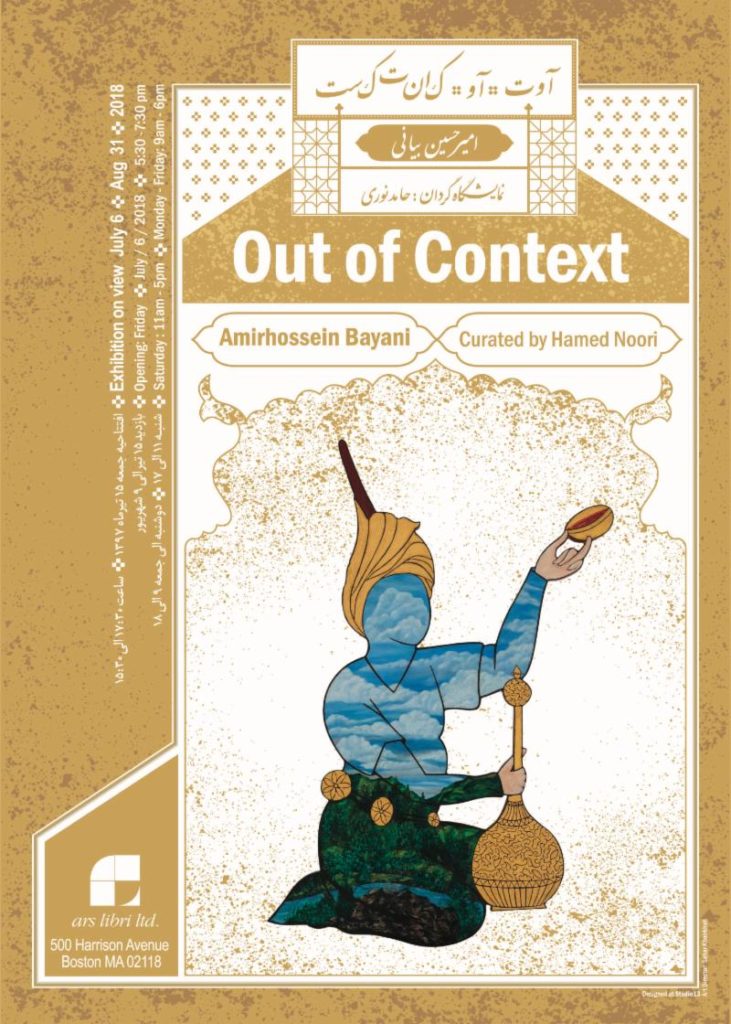
Out of Context
"With an utterly critical approach, the series deals with politics of power, considering how it empties the subjects of their essence, and how it manipulates reality. After studying various elements in Persian miniatures, which generally depend on different contexts, I have taken these blown-up figures out of their contexts, filling them up with new aesthetics and with what formerly existed outside of them. Lost and bewildered, they live in white contexts on the walls, which they don’t belong. The series aims at capturing the essence of art in a paradoxical fashion, keeping possibilities for emancipation in perspective." From https://curiator.com/art/amirhossein-bayani/out-of-context-12
OUT OF CONTEXT
As described by the artist, AMIRHOSSEIN BAYANI
"The series deals with politics. Not politics of emancipation, but power politics. With an utterly critical approach, it is trying to confront the part of politics that is zeroing in on the entirety of human existence and is trying hard to annihilate it. It is as if we are facing the mere fact which directs all the ways towards economic globalization and art globalization. It goes without saying to considering this issue exhaustively in a single series is impossible. Thus, it is focusing on how the subject is colonized by the politics of power. It talks about the part in which the politics of power acts subtly with violence and with a fashionable appearance! , emptying the subjects of their substance, changing identities, perpetually attacking the organic unity of subjects, taking care of everything, repeatedly manipulating the reality, advertising it, and finally making them authentic so much so that any critical approach would be immediately accused of being reactionary and recessive: an intricate mechanism that owes its very existence to creating crisis.
Persian forms are pictures in tiny scales, with disorderly compositions, that generally make a unique, unified experience for the viewer. Commonly, they narrate a story that exists outside of them: they depend on a different context. They are very gentle and poetic, even when they narrate the most violent scenes; according to their different eras, they have their particular stylistic characteristics. The elements are generally idealized, they emphasize details, and they have their own perspective. We can go on talking and doing research about Persian images for years.
In this series, I have considered all the elements of Persian images, except their nature. In the first stage of using violence, I have cut out a piece out of them and have taken them out of their context. Then I have blown them up, much larger than their original size, which is to say I have aggrandized them, it is as if we are seeing microscopic images! It is as if they are being zoomed in. It is as if they are control samples. In the next stage, I realized that the aesthetic inside them is not enough, so I decided to bring in a new kind of aesthetic. I poured their surrounding nature, which was working properly as context for the figures’ initial conditions, into them and I even gave them ideas! I even changed the material of technical approach and led the technical part to a direction that I wanted.
What we eventually see is only reminiscent of Persian painting, and they are even more seductive and apparently self-contained. But they are in fact new subjects emptied of their essence. Lost and bewildered, they live in white contexts on the walls to which they do not belong.
This show is aimed at capturing the essence of art in a paradoxical manner in order to establish a dialogue between the aesthetics of art and potential emancipation latent in politics and to admit standing within the circle of power while keeping possibilities for emancipation in perspective."
--Amirhossein Bayani (From http://mohsen.gallery/artists/series/2016/out-of-context-2/)
About the Artist:
Amirhossein Bayani
Born in 1977
Artist, Curator, and University Professor
Education
2004 M.A. in Art Research, Art & Architecture Faculty of Azad Art University
2000 B.A. in Painting, University of Art, Tehran
Visual Art Diploma, IRIB Art School
Some Activities
2011 Founder and Art Director at MERXOUT Projects
2013 Member of Artraker winners
Member of Iranian Painters Society
Member of Institute for Promotion of Visual Arts
Member of electorate committee of Radio & Television College
Founder of Tehran Art Group
Curating Experiences
2014 Salvation Gaza, Niavaran Complex, Tehran, Iran
2013 MERXOUT Projects, Open Source, Shirin Gallery, Tehran, Iran
2012 MERXOUT Projects, OCCUPY ME! (Dedicated to RADIOHEAD), Mohsen Gallery, Tehran, Iran
2011 Pool, Mohsen Gallery, Tehran, Iran
2010 In Honour of 68, Mohsen Gallery, Tehran, Iran
Solo Exhibitions
2016 “Out of Context”, Mohsen Gallery, Tehran, Iran
2013 Babylon System, Mohsen Gallery, Tehran, Iran
2010 What was happened to the women in shahnameh? , Mohsen Gallery, Tehran, Iran
2009 Brides of Our Time, Etemad Art Gallery, Tehran, Iran
2006 Eyes’ wide shot, Azad art gallery, Tehran, Iran
International Group Exhibitions
2017 “Shadow of Garden”, Stiftelsen 3,14 Gallery , Bergen, Norway
2013 Artraker, Babylon System (top 3 selected by Jury), London, UK
2013 Babylon System (Video), Goldsmiths University, London, UK
2013 Facade Video Festival, Message from Iran (top 10 selected by the jury), Plovdiv, Bulgaria
2013 Down street Art, Massachusetts, the USA
2013 SOMART, Speak Your Peace
2012 The 5th Beijing International Art Biennale, National Art Museum of China, Beijing, China
2011 Contemporary Istanbul, International Art Fai, Istanbul, Turkey
2011 BERLINER LISTE, International Art Fair, Berlin, Germany
2010 The 4th Beijing International Art Biennale, National Art Museum of China, Beijing, China
2008 Group painting exhibition, Heaven on Earth Now, The Brick Lane Gallery, London, UK
2007 CAREVAN, Shiraz art gallery, Venice, Italy
2007 Group painting exhibition with Iranian contemporary artists, Dar-All-Fonoon art gallery, Kuwait
2007 Painting exhibition with Iranian contemporary artists, Assar Art Gallery
Group Exhibitions
2017 “Postcards”, Azad Art Gallery, Tehran, Iran
2017 “Trends and Approaches in Contemporary Iranian Art”, Pardis Mellat Gallery, Tehran, Iran
2016 Shahnameh, the Perpetual Narrative, Curator: Akram Tavana , Arran Art Gallery
2014 Zoo, Shirin Art Gallery
2014 A Review of decade of Video Art in Iran, Iranian Artists Forum
2013 “History Game”, Etemad Gallery
2013 Group Exhibition Titled: Shahnameh FerdowsiI, Curator: Reza Hedayat Laleh Art Gallery, Tehran, Iran
2012 Mesociety Tehran Workshop, a Hydro city Project
2011 13X18 PORTRAIT, Etemad Art Gallery, Tehran, Iran
2010 Performance Box Curatorship, Mohsen Gallery, Tehran, Iran
2010 “To Paint Cinema”, Mohsen Gallery, Tehran, Iran
2010 Obligatory Military Service, Mohsen Gallery, Tehran, Iran
2010 Second Memorial of Professor Freidoon Mam Beigi, Mohsen Gallery, Tehran, Iran
2010 Drawing exhibition with Iranian contemporary artists, Mohsen Gallery, Tehran, Iran
2008 First Memorial of Professor Freidoon Mam Beigi, Azad Art Gallery, Tehran, Iran
Art Fair
2014 ART14 LONDON, International Art Fair, London, UK
2011 BERLINER LISTE International Art Fair, Berlin, Germany
2011 Contemporary Istanbul International Art Fair, Istanbul, Turkey
Thomas Berger Appointed New Center for the Study of Asia Director
APRIL 24, 2018
The Center for the Study of Asia (BUCSA), an affiliated regional center of the Frederick S. Pardee School of Global Studies at Boston University, hosted their annual spring reception on April 23, 2018 where Thomas Berger, Pardee School Professor of International Relations, was introduced as the new BUCSA Director.
Pardee School Dean Adil Najam thanked outgoing BUCSA Director Catherine Yeh for her tireless work and leadership of the center over the past three years. Under Yeh’s leadership, BUCSA has promoted comprehensive, interdisciplinary, and cross-national understanding of Asia through coordination of teaching missions, research support, community-building among faculty and students, and broad outreach beyond the university.
Berger, an expert in international relations, comparative government and political culture in East Asia, was introduced as the new BUCSA Director at the reception.
Preceding the reception, BUCSA hosted an exhibition opening entitled Asia at the World’s Fairs: An Online Exhibition of Cultural Exchange.” The symposium featured presentations on the cultural, political, and economic roles of international exhibitions through history, and an exploration of the participating and impact of Asian cultures at these wildly popular and influential events.
The evolving exhibition’s first two “themes” focus on Asian dance and architecture at the fairs, and presenters discussed how the exhibition can serve as an engaging, interactive vehicle for the study of many other themes in the future.
This academic year, BUCSA has also hosted a symposium on yogic traditions in the U.S., and a Diwali celebration entitled “The Art of Light in Asia.”
Berger is the author of War, Guilt and World Politics After World War II, Cultures of Antimilitarism: National Security in Germany and Japan and is co-editor of Japan in International Politics: The Foreign Policies of an Adaptive State. His articles and essays have appeared in numerous edited volumes and journals, including International Security, Review of International Studies, German Politics and World Affairs Quarterly.
Harvard Journal of Asiatic Studies Book Review Editor position
The Harvard Journal of Asiatic Studies (HJAS) is searching for a new part-time book review editor. We are seeking an established scholar of East Asian studies or Inner Asian studies. Further details about the position, the Journal, and the application process are at https://harvard-yenching.org/hjas-book-review-editor, including the attached PDF below. Anyone with questions about the position should contact Melissa Brown by e-mail at <melbrown [at] fas.harvard.edu>.
HJAS BookRev Editor job 180521

Corky White and Debra Samuels co-curate “Objects of Use and Beauty: Design and Craft in Japanese Culinary Tools”
Now on exhibit at the Fuller Craft Museum, 455 Oak Street, Brockton, MA
Objects of Use and Beauty: Design and Craft in Japanese Culinary Tools
June 2, 2018 - October 28, 2018
 Objects of Use and Beauty: Design and Craft in Japanese Culinary Tools demonstrates the beauty of design and use in Japanese cooking and reveal the artistry of craftsmanship in such tools as knives, whisks, ceramic kama, and other important items. The use of materials such as bamboo, clay, cedar wood, metals and other natural substances is accompanied by contemporary materials in contemporary designs. Videos of craftspeople at work in their studios and forges are included, as well as the tools themselves and narratives concerning their use. In addition, the exhibition provides a glimpse at a Japanese home kitchen and videos demonstrating the making of Japanese foods.
Objects of Use and Beauty: Design and Craft in Japanese Culinary Tools demonstrates the beauty of design and use in Japanese cooking and reveal the artistry of craftsmanship in such tools as knives, whisks, ceramic kama, and other important items. The use of materials such as bamboo, clay, cedar wood, metals and other natural substances is accompanied by contemporary materials in contemporary designs. Videos of craftspeople at work in their studios and forges are included, as well as the tools themselves and narratives concerning their use. In addition, the exhibition provides a glimpse at a Japanese home kitchen and videos demonstrating the making of Japanese foods.
Co-Curators: Debra Samuels and Merry White
Sponsored by the Caroline R. Graboys Fund, the Japan World Exposition 1970 Commemorative Fund, and The Japan Foundation, New York.
The exhibition catalogue is available here.
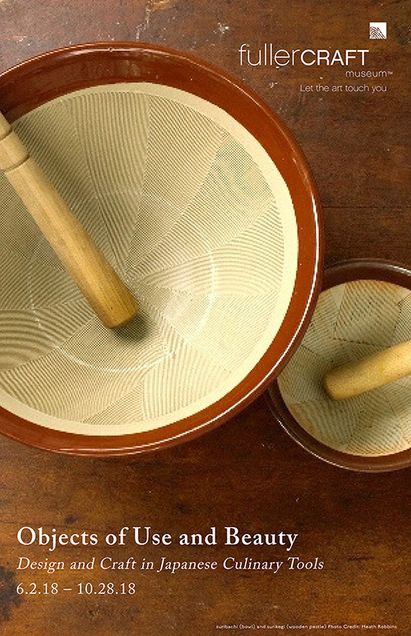
Harvard Fairbank Center Gender Studies Workshop: Gender and Friendship in China. May 4, 2018
Gender Studies Workshop: Gender and Friendship in China
Sponsored by the Fairbank Center for Chinese Studies, Harvard University
May 4, 2018 12:45-5:30 pm at CGIS South Room S354, 1730 Cambridge St, Cambridge, MA 02138
For full details, see http://fairbank.fas.harvard.edu/events/gender-studies-workshop-gender-and-friendship-in-china/
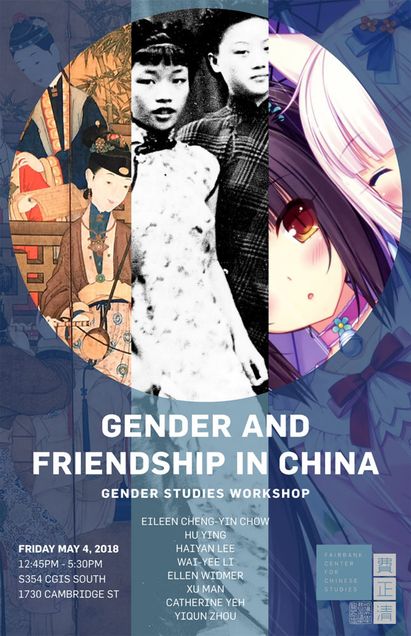
Program:
12:45-1 p.m. Welcoming remarks
First Panel
Moderator: Wai-yee Li, Harvard University
1-1:30p.m. Zhou Yiqun, Stanford University: “Hermits and Their Wives in Early Chinese Texts”
1:30-2p.m. Hu Ying, University of California Irvine: “Strange Friends: Reconceptualizing Gender and Community”
2-2:30p.m. Ellen Widmer, Wellesley College: “Intercultural Mutuality: Mary Hannah Fulton (1854-1927) and Zhang Jujun (1879-1964)”
2:30-3p.m. Discussion
3-3:30p.m. Break
Second Panel
Moderator: Xu Man, Tufts University
3:30-4p.m. Haiyan Lee, Stanford University: “‘Now We Have a Baby’: A Very Short Genealogy of the Pure Relationship in Chinese Literature”
4-4:30p.m. Catherine Vance Yeh, Boston University: “Friendship in the Staging of a Star: Mei Lanfang”
4:30-5p.m. Eileen Chow, Duke University: “‘有沒有愛?’:Tongren Culture, Fandom and ‘Benefits with Friendship’”
5-5:30p.m. Discussion
Exhibition Opening: Asia at the World’s Fairs, April 23 from 3-5 pm
Asia at the World's Fairs:
An Online Exhibition of Cultural Exchange
Monday, April 23, 2018 from 3:00 p.m. to 5:00 p.m
Boston University
The Arrival of Asia: Asian Culture on the Stage at World’s Fairs, 1851-1939
The first modern international exhibition or “world’s fair” in 1851 in London’s spectacular “Crystal Palace” launched the idea of bringing together the world’s cultures and goods in one huge exposition as a showcase of human progress. During subsequent decades, the popularity of this medium spread around the world and many international fairs were organized throughout the late 19th and 20th centuries, and more than 100 such international fairs have been held in more than 20 countries. In these expositions a wide variety of industrial, scientific, and cultural items were on display. These vast exhibitions became a focal point where the world’s people and cultures found a space for communication, exchange, and understanding and inspiration.
Ever since the earliest international exhibition in London, Asia has been represented in these universal expositions, with its rich, vibrant and diverse histories and cultures providing many fairgoers their first encounter with Asia. While these fairs frequently highlighted the industrial and technical prowess of the host country, they also were eager to present the richness and diversity of the world’s cultures to a public fascinated by the prospect of seeing itself in a world context. Taking place during a time of widespread colonialism, the notion of the world presented at these fairs had many layers of meanings. In many cases, local arts and crafts were selected and showcased by the colonial administrations. Yet, many Asian countries also played an active part in confronting and redressing the asymmetry of power in their relationship to the West by presenting in these exhibitions their own image of their country and culture. These expositions served as a stage that displayed a complex history of conflicts, contradictions, and engagement of Asia with the world.
Our online exhibition focuses on the presence in these early international fairs of Asian cultures and the stimulus they gave to transcultural interactions in areas as diverse as performing arts, architecture, painting, sculpture, print and even food. Not to minimize the unequal political and economic backdrop of the various early world fairs, this exhibition intends to create a platform for an open discussion of the contributions Asian cultures have made on the world stage at these fairs and the enormous impact they had on millions of fairgoers for whom the “world” as a concept became real for the first time. The dynamics in the field of cultural interaction show a give and take enriching all sides.
Please join us for the celebratory opening of our exciting new online digital initiative, Asia at the World’s Fairs: An Online Exhibition of Cultural Exchange.The symposium (Monday, April 23, 2018 from 3:00 – 5:00 pm) will be featuring presentations on the cultural, political, and economic roles of international exhibitions through history, and an exploration of the inclusion and impact of Asian cultures at these wildly popular and influential events. We will be presenting our evolving exhibition’s first two “themes” that will focus on Asian dance and architecture at the fairs, and discuss how this online exhibition can serve as an engaging, interactive vehicle for the study of many other themes in the future.
Asia at the World’s Fairs: An Online Exhibition of Cultural Exchange
Director and Project Curator: Catherine V. Yeh
Web-designer: Janet Liu
Co-curators: Janet Liu, Robert Murowchick, Alice Tseng, and Wen-hao Tien
Organized by BU Center for the Study of Asia, Frederick S. Pardee School of Global Studies
BUCSA Spring Reception! April 23 from 5-6:30 pm
As the school year draws to a close, it's time to celebrate with colleagues and friends! Join us at the BU Center for the Study of Asia's Spring Reception
on Monday, April 23, 2018 from 5-6:30 pm on the 4th floor of BU Hillel House,
213 Bay State Road.
Great food, live music, and lively conversation as we look back on an unbelievably busy year celebrating Asia's Cultural Heritage through performances of music and dance, lectures and films.
We hope that you will also attend our Symposium on the BUCSA Digital Exhibition,
Asia at the World's Fairs, which is taking place prior to the reception.
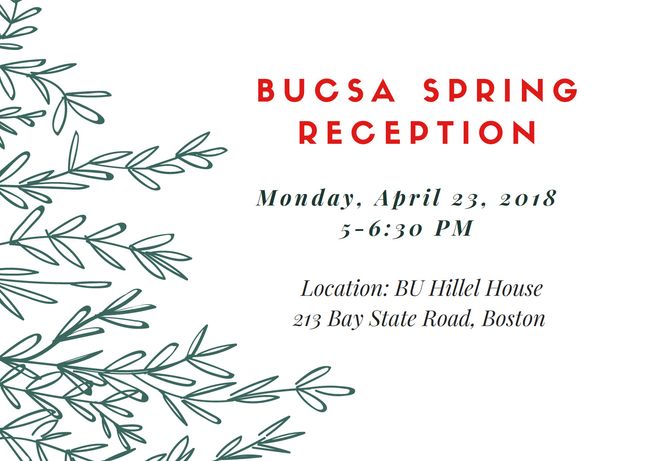
China’s Energy Future: Potential Implications for Air Quality, Health and Climate Change
The BU Global Development Policy Center and the
BU Center for the Study of Asia
are pleased to present a lecture by
Denise Mauzerall
(Professor, Dept. of Civil and Environmental Engineering and the
Woodrow Wilson School of Public and International Affairs, Princeton University)
China's Energy Future: Potential Implications for Air Quality, Health, and Climate Change
Wednesday, April 25, 2018 from 3:00 to 4:30 pm
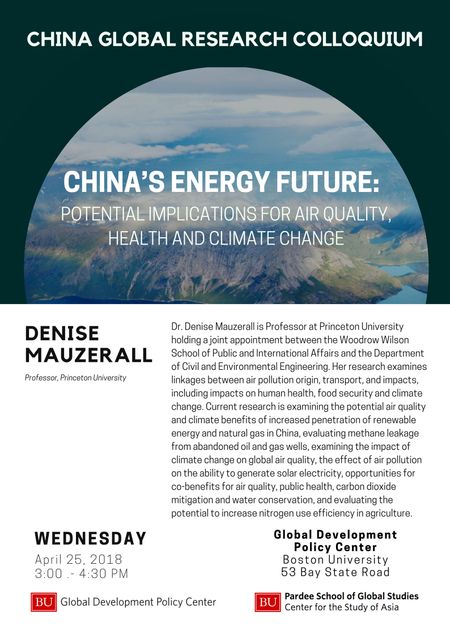
This lecture will take place at
Global Development Policy Center
53 Bay State Road, Boston University from 3-4:30 pm
Seeking a Future for East Asia’s Past: Sinographic Sphere Studies, April 27
Seeking a Future for East Asia’s Past:
A Workshop on Sinographic Sphere Studies
Friday, April 27, 2018 from 8:30 a.m. to 6:30 p.m.
Boston University
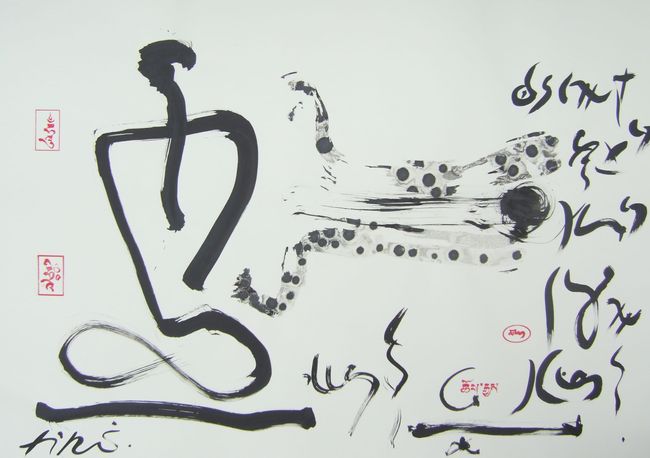
"16-tibetan-art-calligraphy-practice-IV-china-ink." Calligraphy by SI-LA-GI
(Szabolcs Szilágyi), courtesy of the artist, http://www.si-la-gi.com
Co-sponsored by the Boston University's Center for the Humanities, the Center for the Study of Asia, Department of World Languages and Literatures, and the College of Arts and Sciences
This workshop will take place at
Boston University School of Theology STH B23, (745 Commonwealth Ave., Boston)
from 8:30 am to 6:30 pm
In the early twentieth century, East Asia’s traditional Sinographic Sphere broke apart. What is the future of its legacy in the early twenty-first century? This workshop will present a day of visionary brainstorming with students and scholars articulating the future of their mission to recapture the region’s shared past in a divisive present.
PROGRAM
Friday, April 27
8:30-8:45 am: Registration
8:45 am: WELCOME
Wiebke Denecke (Dept. of World Languages and Literatures, Boston University)
9-9:45 am: KEYNOTE ADDRESS
Victor Mair (University of Pennsylvania), “Sinographic Sphere Studies: Problems, Prospects, and Priorities”
9:45-11:30 am: SESSION 1
Conceptualizing “East Asia”: Master Narratives, Terminologies, Translation Issues
11:30 am COFFEE BREAK
11:45 am-1:30 pm SESSION 2
Hot Spots in the Study of “East Asia:” Past, Present, Future
1:30-2:30 pm LUNCH
2:30-4:15 pm SESSION 3
Academic Study of “East Asia:” Institutional Realities, Obstacles, Opportunities
4:15-4:30 pm COFFEE BREAK
4:30-6:15 pm SESSION 4
Teaching and Communicating “East Asia:” Pedagogy, Publishing and the Public Sphere
6.15 CLOSING REMARKS
SPEAKERS
Victor Mair (keynote speaker) (University of Pennsylvania)
Wiebke Denecke (Boston University)
Matthew Fraleigh (Brandeis University)
Terry Kawashima (University of Massachusetts, Boston)
Ross King (University of British Columbia)
Jeffrey Niedermaier (Yale University)
Si Nae Park (Harvard University)
Brian Steininger (Princeton University)
Keith Taylor (Cornell University)
Xin Wei (BU, Korea Foundation Postdoctoral Fellow)
Min Jung You (Sungkyunkwan University, Seoul)
SPEAKER BIOGRAPHIES
Keynote Speaker: Victor H. Mair is Professor of Chinese Language and Literature at the University of Pennsylvania, where he has been teaching since 1979. He holds degrees from Dartmouth College (B.A. magna cum laude 1965), the School of Oriental and African Studies of the University of London (B.A. Hon. 1972, M. Phil. 1984), and Harvard University (Ph.D. 1976).
Mair spent the first twenty years of his career working on manuscripts from a cave site at Dunhuang in the far northwest of China, particularly the earliest vernacular narratives in Chinese called bianwen ("transformation texts"). He is the author or editor of more than two dozen books, and has written more than a hundred articles and over three hundred reviews.
Mair is the editor of Sino-Platonic Papers and is on the editorial boards of several other Sinological journals. He is the founding editor of the ABC Chinese Dictionary Series at the University of Hawai'i Press, the Encounters with Asia Series at the University of Pennsylvania Press, and the Sinophone World Series at Cambria Press. Among his many interests are Sino-Indian and Sino-Iranian cultural relations, the Bronze Age and Early Iron Age of Eastern Central Asia, and the origins and evolution of the Chinese script. He blogs frequently on Chinese language issues for Language Log.
Wiebke Denecke is Associate Professor of East Asian Literatures & Comparative at Boston University. She received her MA from the University of Göttingen (Germany) and her PhD from Harvard University. Her interests include literatures and intellectual history of premodern China, Japan, and Korea, comparative studies of East Asia and the premodern world, and world literature. She is the author of The Dynamics of Masters Literature: Early Chinese Thought from Confucius to Han Feizi (Harvard UP, 2010), Classical World Literatures: Sino-Japanese and Greco-Roman Comparisons (Oxford UP, 2014), and an editor of The Norton Anthology of World Literature (2012, 2018), The Oxford Handbook of Classical Chinese Literature (2017) and a three-volume literary history of Japan from an East Asian perspective (Nihon “bun”gakushi. A New History of Japanese “Letterature”) (2015-). With Zhang Longxi, she edits the book series East Asian Comparative Literature and Culture (Brill publishers). Denecke is currently working on a project situating early Japanese literature in relationship to China and Korea, on translations of Kim Sisŭp’s (1435-93) poetry, and on a project about the global, comparative study of literary cultures.
Matthew Fraleigh is Associate Professor of East Asian Literature and Culture at Brandeis University, where he chairs the Program in Comparative Literature and co-chairs the Program in East Asian Studies. His research concerns the literature of early modern and modern Japan, especially kanshibun (Sinitic poetry and prose). His work has appeared in journals such as Japanese Studies, Monumenta Nipponica, Harvard Journal of Asiatic Studies, Kokugo kokubun, and the London Review of Books. He has published two books focused on the nineteenth century Sinological scholar, poet, and journalist Narushima Ryūhoku: a study entitled Plucking Chrysanthemums: Narushima Ryūhoku and Sinitic Literary Traditions in Modern Japan (Harvard, 2016), and an annotated translation, New Chronicles of Yanagibashi and Diary of a Journey to the West: Narushima Ryūhoku Reports From Home and Abroad (Cornell, 2010). The latter book was awarded the Japan-U.S. Friendship Commission Prize in 2011, and in 2012, Fraleigh received the Sibley Prize for his translation of Ryūhoku’s prison essay, “Super Secret Tales From the Slammer.” He is currently working on a book project that seeks to understand how early modern and modern Japanese conceptualized the act of composing Sinitic poetry.
Terry Kawashima is Professor and Chair of the Department of Asian Studies at University of Massachusetts, Boston. She earned her B.A. from Cornell University in Asian Studies and Art History, an M.A. from Harvard University in Regional Studies – East Asia, and a Ph.D. from Harvard University in premodern Japanese literature from the Department of East Asian Languages and Civilizations. She specializes in literature and culture of the Heian and medieval periods in Japan (800-1500), with a particular interest in how texts envision and contribute to the construction of authority, legitimacy, and power in social, political, religious, and gendered arenas. She is the author of two books: Writing Margins: The Textual Construction of Gender in Heian and Kamakura Japan (Harvard Asia Center Publications, 2001), about gendered discourses of marginalization in poetry and prose, and Itineraries of Power: Texts and Traversals in Heian and Medieval Japan (Harvard Asia Center Publications, 2017), about narrative strategies of movement, such as representations of exile and divine travel. She is currently working on a project on tropes of rebirth in premodern and modern Japan; her recent article, “Transmigration and Metaphor in Hamamatsu Chūnagon monogatari,” is part of this project.
Ross King earned his B.A. in Linguistics and Political Science from Yale College and his M.A. and Ph.D. from Harvard in Linguistics. Currently he serves as Professor of Korean and Head of Department in the Department of Asian Studies at the University of British Columbia in Vancouver, Canada. His main research interests are Korean historical linguistics, Korean dialectology (esp. the dialect(s) preserved by the ethnic Korean minority in Russia and the former USSR), the history of Korean linguistics (including the history of Korean linguistic thought in Korea and Korean linguistic and script nationalism), and the history of language, writing and literary culture in the ‘Sinographic Cosmopolis’ (漢字文化圈).
Jeffrey Niedermaier is a doctoral candidate at Yale University’s Department of East Asian Languages and Literatures. He researches Japanese vernacular poetry (waka) and sinitic poetry (kanshi) in premodern Japanese literary culture. He is interested in the wa-kan (or “Japanese”-“Chinese”) dynamic that pervades Japanese literature—and especially in the moments where the bipolarity of this dynamic breaks down: poets and writers at times deployed wa and kan to evoke not only China or Japan, but also such far-flung topoi as Parhae, Persia, Penglai, Portugal, and beyond. The subject of Jeffrey’s doctoral dissertation is the Wakan rōeishū (The Collection of Japanese and Chinese Poems to Sing), a bilingual and “biscriptal” anthology arranged by topic and compiled by the virtuosic Japanese courtier Fujiwara no Kintō after the turn of the eleventh century. The genesis and reception of this monumental poetic work, he argues, furnishes us with an unrivaled view of how premodern Japanese readers and writers envisioned, imagined, and engaged with their wider world in a literary way.
Si Nae Park is Assistant Professor of East Asian Languages and Civilizations at Harvard University. As a pre-20th-century Korean literature specialist, Park is interested in topics such as the forging of vernacular identity through inscription of time, place, and language, the history of the book, of writing, and of reading, and literary representations of Seoul in the late eighteenth century and early nineteenth century. She has co-edited Score One for the Dancing Girl, and Other Selections from the Kimun ch’onghwa and is currently completing a book manuscript entitled Stories in Our Time, In Our Language: The Rise of the Vernacular Story in Late Chosŏn Korea.
Brian Steininger (Princeton University) researches poetics, cultures and institutions of scholarship, and media/book history in the context of early and medieval Japan. His first book, Chinese Literary Forms in Heian Japan: Poetics and Practice, was published last year by Harvard University Asia Center.
K. W. Taylor, Professor in the Department of Asian Studies, Cornell University, has published books and articles on Vietnamese history and literature during the past 40 years. He is author of A History of the Vietnamese (Cambridge University Press, 2013). His latest article is “What lies behind the earliest story of Buddhism in ancient Vietnam?” Journal of Asian Studies 77, 1 (February 2018):107-122. He is currently researching poetry from the 16th and 17th centuries.
Xin Wei completed her doctorate with a thesis entitled, "The Literary Chinese Cosmopolis," at the University of Oxford in 2017. She is currently a Korea Foundation Postdoctoral Fellow at Boston University. Her research interests center on Korean hanmun literature delineated within the East Asian literary context. Her co-translated book, Korea's Premier Collection of Classical Literature: Selections from Sŏ Kŏjŏng’s Tongmunsŏn is forthcoming from Hawai'i University Press in Spring 2019.
Hailing from Korea’s historic village Hahoe maŭl You Min Jung is a Ph.D. candidate at Sungkyunkwan University, Seoul. She is working on a dissertation entitled “New Trends in the Study of Commentaries on the Confucian Classics: With Special Attention to the Characteristics, Differences, and Meaning of Rhetorically-Oriented Exegesis.” Her academic interests include the Confucian Classics in East Asia and classical Korean literature. She aims to study the intellectual changes in East Asian literati culture and exegetical traditions during the 17th to 19th centuries.
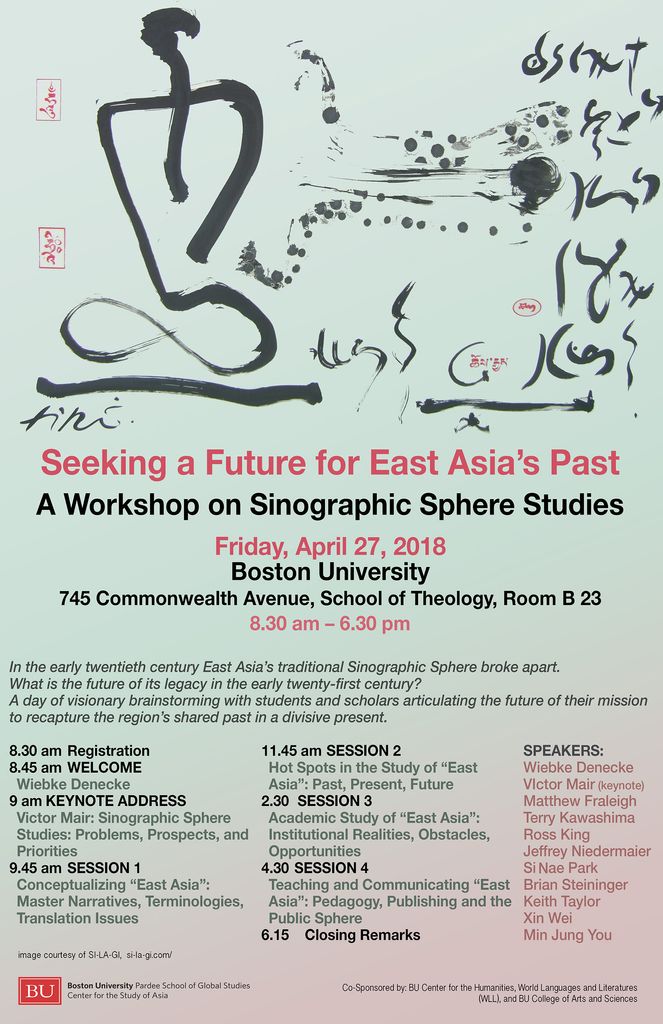
Policies Governing China’s Overseas Development Finance, April 27
The BU Global Development Policy Center and the
BU Center for the Study of Asia
are pleased to present a lecture by
Qi Qi
(Ph.D. Candidate, Fletcher School of Law and Diplomacy, and Dept. of Economics, Tufts University)
Policies Governing China's Overseas Development Finance: Implications for Climate Change
Friday, April 27, 2018 from 3:00 to 4:30 pm
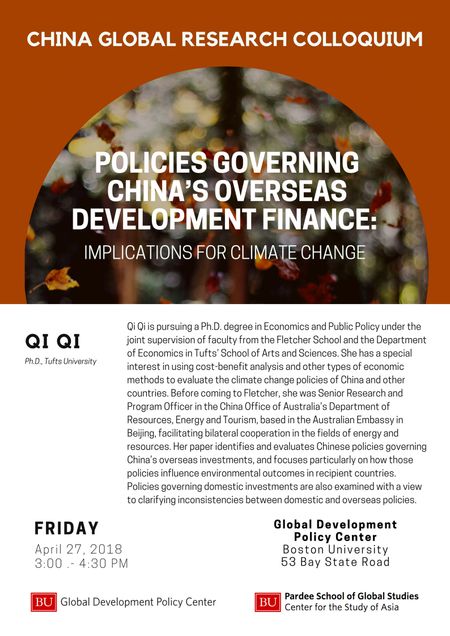
This lecture will take place at
Global Development Policy Center
53 Bay State Road, Boston University from 3-4:30 pm
